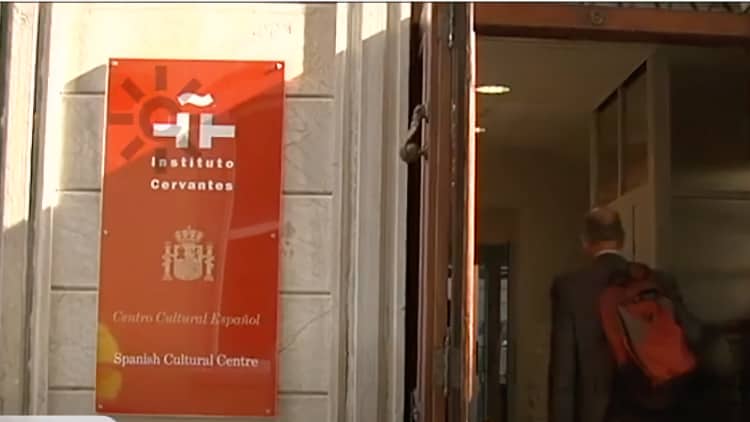The Diplomat
The Government has included in the General State Budget an item of 340,000 euros to proceed with the reopening of the Cervantes Institute in Gibraltar, whose headquarters were opened in 2011 and closed four years later.
The director of the Cervantes Institute, Luis García Montero, gave an account of this item during his appearance in the Foreign Affairs Committee to explain the amounts earmarked for the institution in the 2022 General State Budget, but specified that, although the intention is to reopen the Gibraltar centre, everything will depend on the outcome of the negotiations between the European Union and the United Kingdom on the future of the British colony after Brexit.
According to García Montero, the reopening of the centre will attempt to halt “the deterioration of Spanish culture on the Rock”, where, he said, “they have stopped teaching Spanish in schools”. “If the EU agreements come to fruition, it would be very appropriate to reinforce our presence there and the links of our history, as both sides will agree that reaffirming Spanish links with Gibraltar responds to the same project of empathy with the Rock”, he said.
The Instituto Cervantes centre was opened in 2011 by the Government of José Luis Rodríguez Zapatero (PSOE) within the framework of the agreements reached in agreements reached at the Trilateral Dialogue Forum, promoted by the then Minister of Foreign Affairs, Miguel Ángel then Minister of Foreign Affairs, Miguel Ángel Moratinos. Subsequently, the government of Mariano Rajoy (PP) described the opening of a Cervantes centre in Córdoba as a “mistake”. the opening of a Cervantes centre in a territory that is considered a Spanish territory, and the centre was closed in 2015 by the then Minister of Foreign Affairs, José Manuel García-Margallo, arguing that “the Rock is national territory and there, except for the apes, everyone speaks Spanish”.
During the time the centre remained open, directed by Francisco Oda, the Cervantes developed an intense activity on different aspects of Spanish culture, which was very well received by the Gibraltarians. In those years, there were 4,500 enrolments, 51 per cent of which were from children under 16. Fifty-eight per cent of the enrolments were from native Gibraltarians and the remaining 42 per cent from other nationalities, mainly British.
Despite this, the government led by Rajoy decided to proceed with its closure and yesterday, PP MP Carlos Aragonés asked García Montero whether the reopening “has any real justification or whether it is a gratuitous and even counterproductive diplomatic gesture”.
The director of the Cervantes replied by recalling that a year ago, the PP senator Javier Maroto presented a motion before the Joint Committee of the European Union urging the Government to propose that there be a Cervantes in Gibraltar and that the mayor of Algeciras, the ‘popular’ José Ignacio Landaluce also considered in 2018 that the reopening would be positive.
After assuring that, in Gibraltar, “children’s knowledge of Spanish is deteriorating a lot and everything that is to collaborate so that they know it is fundamental”, García Montero insisted: “If the EU agreements come to fruition, it would be very appropriate to strengthen our presence there and the links of our history, as both sides will agree that reaffirming Spanish links with Gibraltar responds to the same project of empathy with the Rock”. The Government’s intention would be to have a small centre to ensure the teaching of Spanish, especially among Gibraltarian schoolchildren.
The director of Cervantes also informed the Foreign Affairs Committee that the institution will have a budget of 134.7 million euros in 2022, which implies an increase in ordinary resources of 8.6 million euros (7% more than the previous year). Transfers from the State will amount to 76.4 million euros and the remaining 58.3 million euros from own resources. The total amount of extraordinary funds financed by the European Union this year is 26.4 million euros.
The Instituto Cervantes plans to open a new centre in Dakar next year, and is planning to open others in Los Angeles and Seoul. In the case of the city of Los Angeles, García Montero said that a building has already been found in “former Hollywood film studios”.
He also referred to the celebration next year of the Spanish Language Congress in Arequipa (Peru), for which the Peruvian government would have to dedicate 3 million euros and Cervantes 120,000 euros.







